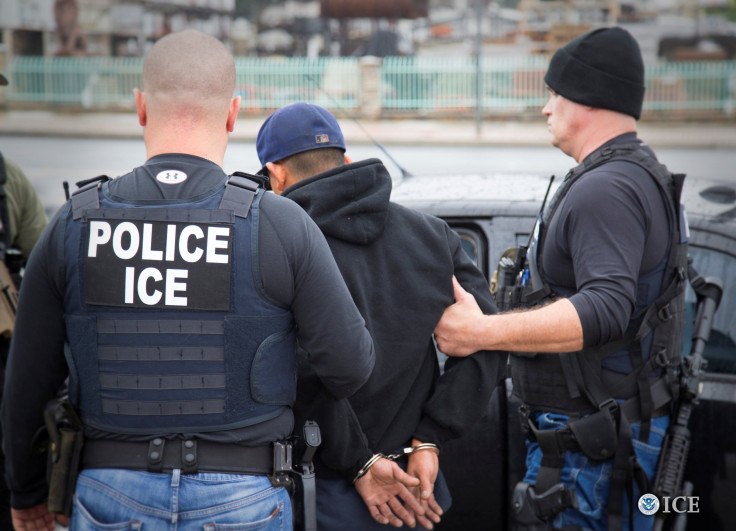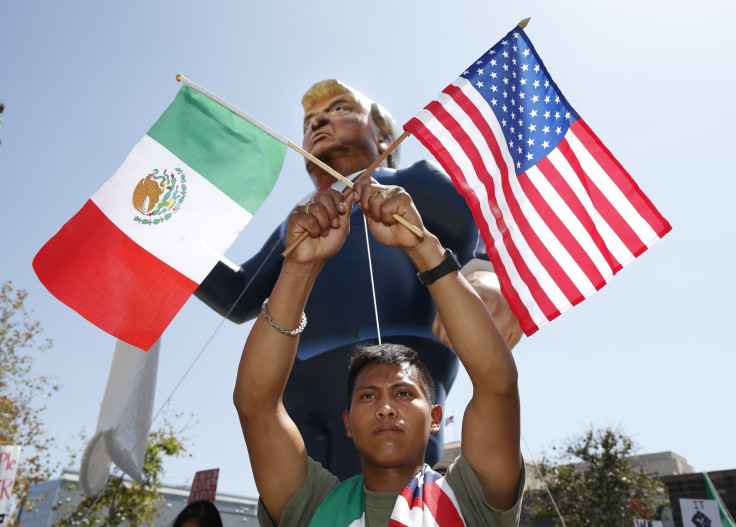Should The US Defend Undocumented People In Immigration Court?

This story is being co-published with Capital & Main as part of a series on California Game Changers: Nine Big Ideas That Could Transform the State and Nation.
On a recent Tuesday afternoon, Cambodian refugee Chea Phov appeared before immigration judge Arlene Dorfman in downtown Los Angeles dressed in a crisp, white shirt and white jeans, and looking much older than his 40 years. He brought his sister and elderly mother to court for support, but he told Dorfman there was one person he couldn’t find: an attorney to represent him.
“ I don’t understand how to fight my case. I barely passed high school,” Phov told Capital & Main. “I believe representing myself is unjust.”
Phov is not alone.
More than 600,000 immigrants are currently battling deportation or fighting for asylum in immigration courts across the country. Nearly 20 percent of them live in California.
Operated by the U.S. Department of Justice, the courts decide whether those who are accused of violating immigration law should be permitted to remain in the country.
Some of those arguing their cases are survivors of domestic violence or torture in their homelands. Others are legal residents with longstanding family and community ties to the United States who have committed crimes, some of them minor and decades in the past. These cases carry far-reaching consequences. Deportation can mean permanent separation from a spouse, children and community, or, if repatriated to their country of origin, persecution, torture or worse.
A 2010 report by the American Bar Association noted that the lack of legal representation was found to be the single biggest determinant of success in immigration court asylum cases. Immigration law is often compared to the tax code in its complexity, but the government doesn’t provide attorneys for those who can’t afford them, as it does in criminal matters. Fewer than 40 percent of those arguing cases in immigration court are represented by an attorney, including children as young as 3, as well as men and women who can’t read or write, or who don’t speak English.
Phov argues that he faces deportation because of a big mistake, but said he can’t make his case for a second chance without legal help. He fled Cambodia with his family, came to the United States when he was 8 and settled in Long Beach. In his early 20s, he said, he drove a getaway car in a robbery and did 13 years in state prison. He denied being one of the bad hombres that politicians from Donald Trump to Jerry Brown contend should be shipped back to where they came from. Phov said he’s been crime-free for four and a half years and has rededicated his life to his Buddhist faith. He said his entire family is in the U.S.; a return to Cambodia would cut him off from everyone he knows, and damage his fragile mental health. He claims to suffer from depression, racing thoughts and bipolar disorder, but has benefited from medication.
“ If they send me to Cambodia, I won’t get my meds.”
Seven years ago, the American Bar Association recommended the federal government establish a sort of public defender system of appointed attorneys for indigent immigrants like Chea Phov. However, Washington has taken no action.
Now, in the face of federal inaction, calls for so-called universal representation in immigration court have grown louder. Last year, the California Coalition for Universal Representation (CCUR), which is made up of nearly two dozen civil rights and immigrant rights groups, called for the state to establish its own free legal representation system for immigration defenses.
“Our society no longer questions the moral and constitutional duty to provide attorneys for individuals in criminal proceedings,” the group’s 2016 report, "California’s Due Process Crisis," noted. “Given the similarity both in form and in severity of the potential consequences, the moral imperative here is equally clear.”
It’s also an issue for California’s social services system, the report claims. Deportations take parents away from their homes, which means more kids in foster care, greater mental health and medical needs, and housing and food insecurity for more families.
The coalition points to New York City, which in 2014 became the first in the country to offer free representation for all indigent residents, as well as for New Yorkers detained in neighboring New Jersey who face deportation. Meanwhile, this year California lawmakers have allocated $45 million to fund legal representation in immigration court, while the Trump administration’s deportation push has spurred Los Angeles, San Francisco, Atlanta, Chicago, Austin and Washington, DC to consider programs similar to New York City’s.

A study by the American Immigration Council last year further found that detained immigrants were twice as likely to win their cases if they had attorneys. Those who weren’t detained were five times more likely to prevail. Among children, the differences are even starker. Also in 2016, the National Immigrant Justice Center reported that 73 percent of those who have representation are allowed to stay in the U.S., while only 15 percent of unrepresented children are allowed to remain here.
“ Immigration law is so difficult and so complex,” said Patricia Ortiz, program director at Esperanza Immigrant Rights Project in Los Angeles. “To expect someone to do it on their own is pretty ridiculous.”
Ortiz said it’s so hard for people to understand the system that some show up for her organization’s legal orientation meetings unaware that they’ve already been ordered deported.
To help people find counsel, the courts distribute lists of nonprofits like Esperanza, which is run by Catholic Charities. Some 20 such groups provide free and low-cost representation around the state, but demand for services far outstrips capacity, said Robert Foss, division attorney at the International Institute of Los Angeles, a Lincoln Heights nonprofit that helps immigrants settle into new lives in the United States.
“ The intake is often overwhelming,” Foss said. “You do a legal triage, you find the most humanitarian or egregious cases. Our formula is cases that most need our help and maybe have a chance to win. It’s tricky and it means saying no to a lot of people.”
In Los Angeles and San Francisco, more than two-thirds of those in immigration proceedings are represented. But if you live in Atlanta or Kansas City, your chances of finding a lawyer are less than 50-50.
The odds are overwhelming against those who are sitting in immigration detention.
Detainees in Adelanto, the massive high desert lock-up near San Bernardino, California, have only a 13 percent chance of securing attorney representation, while those in San Diego fared only slightly better, with a 17 percent chance, the American Immigration Council study found.
Using 2015 figures, the CCUR report argues the state of California could level the playing field with an outlay of $37 million to cover legal defense for the 7,400 Californians who were unrepresented in immigration court that year. The figures are likely larger this year, because of the record number of cases in the courts. The group’s report notes that the state could recoup its investment in the form of decreased foster care costs, lower mental and medical care expenses for traumatized families and millions spent by businesses to hire and train replacement workers for those lost to deportation.
However, the economic case for a federal universal representation program is even stronger. A 2014 study commissioned by the New York City Bar Association and conducted by John Montgomery, a former member of President Bill Clinton’s Council of Economic Advisors, found that universal representation would cost about $208 million nationally, but the cost would be offset by a savings of about the same amount —$204 to $208 million—in detention and related costs.
At its core, however, the debate is about justice, with universal representation supporters and opponents at odds over just what is fair.
Take a person who steals a bag of chips, said Jeremy McKinney, an attorney and secretary of the American Immigration Lawyers Association, who practices in North Carolina. The man gets a free lawyer. However, McKinney noted, a person in deportation proceedings may risk return to a war-torn or authoritarian country where he could be killed. “There is something that is not just about that,” McKinney, said. “Maybe we need to look at extending those protections to people who face permanent exile from our country.”
But Chapman University law professor and constitutional law scholar John Eastman disagrees.
“ If that’s the argument, why not provide mandatory taxpayer-funded representation in family court?” he said, noting that the stakes are high there, too, as they are in other areas of civil law.
“ You open the door here and there’s all sorts of other claimants that are equally sympathetic. You pay for someone illegal – why not pay for me in my landlord-tenant dispute or my divorce?” Eastman said.
Still, Eastman said his objection is to making immigration defense a constitutional right, as it is in criminal cases. He said he wouldn’t necessarily oppose Congress appropriating funds for that purpose.
(Kenneth Gardner, a spokesman for the Executive Office for Immigration Review, a branch of the U.S. Department of Justice, which runs the courts, wrote in an email that his agency declines to comment on calls for universal representation.)
Still, a 2013 court victory shows that a system of free appointed counsel for those who can’t afford it can work in immigration court, said American Civil Liberties Union attorney Ahilan Arulanantham. Seven years ago, Arulanantham, who was named a MacArthur fellow last year, filed suit on behalf of José Antonio Franco-González and Guillermo Gomez-Sanchez; both men were stuck indefinitely in immigration detention because they couldn’t afford to hire attorneys, and judges had decided neither man could competently represent himself. The case won class action status and in 2013 a U.S. District Court judge ordered free legal counsel for some individuals with intellectual disabilities and severe mental health issues.
“ The Franco injunction shows that it’s feasible to run a program of appointed legal representation for people facing deportations,” Arulanantham said.
The District Court ruling originally only applied to California, Arizona and Washington. But the government has voluntarily established a nationwide program, Arulanantham said.
“ At bottom, it reflects the judgment that people with serious mental disorders can’t get a fair hearing without competent legal representation, which isn’t particularly shocking.”
Now the Ninth Circuit Court of Appeals is considering a request for rehearing in another of Arulanantham’s cases involving undocumented children between 3 and 17, in which, he argued, children are unsurprisingly outgunned in immigration court. They are generally unable to identify their rights to relief from deportation or do the legal research necessary to support their claims, much less argue against a trained government prosecutor in court. Arulanantham noted that while free legal services for immigrant children have expanded in recent years, some kids are still left to fend for themselves in court.
The effort to expand due process rights in immigration court is likely to continue moving slowly. Meanwhile local and state programs that help fund immigration defense don’t cover everyone who needs help. A large-scale federal program is all but impossible to imagine in the current presidential administration, said Avideh Moussavian of the National Immigration Law Center. But she added that the current patchwork of efforts could one day pave the way for a much larger reform.
“ I think that like many things,” Moussavian said, “it often takes the cumulative effect of local measures to create the tipping point from an advocacy perspective for there to be federal action.”
© Copyright IBTimes 2024. All rights reserved.





















